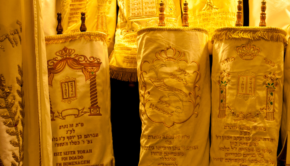Passover: Miracles and Things
What is the connection between cleaning our things and miracles?
As I write this blog I look over my desk with its piles of papers and folders, books and pens, a couple of cans of tile grout, a pocket knife, several electrical cords to various devices, air pods, photos, post cards, a Kleenex box and some crumpled Kleenex, a tea bag and my mug. The mess is a bit daunting, but I’m looking forward to the next few days when I’ll be cleaning this desk and other parts of the house in preparation for Passover. I know from experience that when I clean my surroundings, my mind and even my soul feels lighter and clearer.
Passover is a time when many Jews do a thorough cleaning, getting rid of hametz (leaven) but we are also, I believe, responding to a deep, universal call: cleaning out the old in preparation of the rebirth that is springtime. On the night of Passover we tell the story of the most famous miracle in Torah: the Splitting of the Sea and the crossing of the Israelites from slavery to freedom. We’re retelling the story of the miraculous birth of the nation, and we’re preparing ourselves for whatever renewal we can find in our own lives.
What is the connection between cleaning our things and miracles? A miracle is something that happens beyond our understanding, awesome and unexpected, unexplained, a gift from beyond, a new chance and a new perspective. I get a little hint of that when I clear out my house. I do something to my space, the room where I sit or sleep or read, and somehow I am changed. It feels joyful and renewing and a bit miraculous.
The German writer Jenny Erpenbeck writes, “A house is your third skin, after the skin made of flesh and clothing” (from Visitation, quoted in “Sunbeams” The Sun Magazine, Jan. 2023, p. 48). When we clean our homes we are cleaning ourselves starting from our third skin. It fosters an awareness that we are not isolated, individual beings who exist only in our own heads and bodies. We’re formed in dialogue with our world, always more than ourselves. We are co-arising, emergent, with that which is beyond us.
And we can think of our society, our shared culture as a fourth skin. We are constantly forming and being formed by all our relationships in the collective environment. Society, in the form of our language, our calendar, our norms and shared history and memories, is both in us and around us.
When the Israelites left Egypt to emerge as a new nation, they received the ability to co-create their own time, their own holidays and then their own Teaching, the Torah. So, our holiday that celebrates that birth of a nation, Passover, has a different quality than our other major holidays, Rosh HaShana and Yom Kippur. Those are holidays that start from the inside, call for introspection and inner teshuvah, return to our true selves as individuals. In the month of Nissan, the month of miracles, we start from what is beyond us. We start from our relationships with our things and our social environment. Both sides of the year help us to renew who we are.
So, we clean our homes and we feel that renewal in our bodies and minds along with the sense of living in a renewed, cleaned and cleared home. We not only tell the story of emerging from slavery to freedom, from darkness to light, but we tell the story while sharing our Seder meal with family, friends and perhaps guests that we haven’t met before. Coming together in community, we come to understand a basic truth about ourselves: we are only truly ourselves when we go beyond ourselves.
I just heard about a documentary called Braking Bread about a new Arab-Israeli Food Festival in Haifa. It pairs Arab and Jewish chefs as they collaborate to prepare exotic dishes together. Sometimes it’s the external things like food, like sitting down together, that can change hearts. During the Seder we paradoxically identify ourselves as both enslaved and free because we live in a society where there are poor and rich, oppressed and oppressors and we remind ourselves that we contain all of these within ourselves as well. In our society where the rich insulate themselves from the rest, where people don’t watch the same news channels or hear other opinions, we can lose that sense of being one society. Passover calls on us to make our fourth skin whole by getting to know and supporting those beyond our usual circles.
On Passover we retell the stories of our people, renewing our collective memories, adding our voices to the mix. In our home, we tell people to leave their phones at the door because at least tonight no one should isolate themselves from the gathering by looking at a screen. Passover is a time when, whether we are cleaning our homes or gathering to eat together and retell our collective stories, we can feel a hint of miracle when we go beyond our own skin and open to the fact that we are more than isolated selves. On Passover we remind ourselves that our true selves emerge when we go beyond ourselves.
-Rabbi Natan Margalit Ph.D.
Photo by Masaaki Komori on Unsplash






